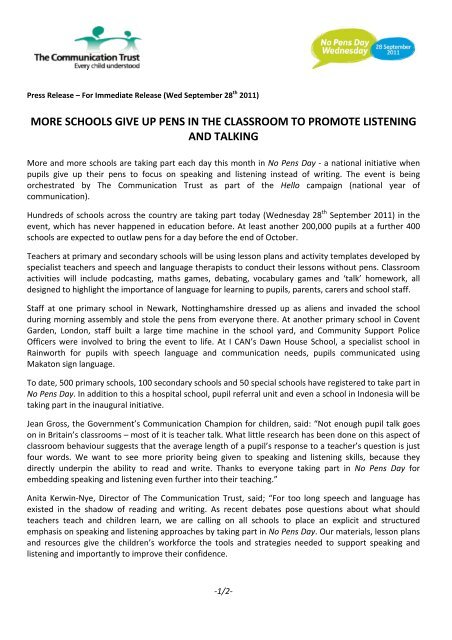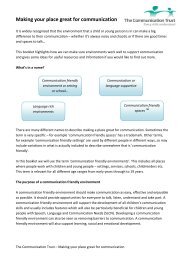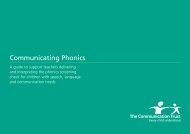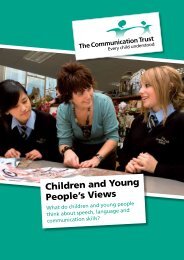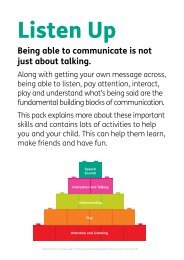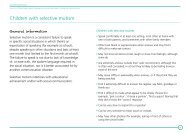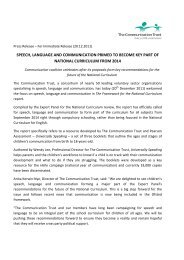No Pens Day Wednesday - The Communication Trust
No Pens Day Wednesday - The Communication Trust
No Pens Day Wednesday - The Communication Trust
- No tags were found...
Create successful ePaper yourself
Turn your PDF publications into a flip-book with our unique Google optimized e-Paper software.
Press Release – For Immediate Release (Wed September 28 th 2011)MORE SCHOOLS GIVE UP PENS IN THE CLASSROOM TO PROMOTE LISTENINGAND TALKINGMore and more schools are taking part each day this month in <strong>No</strong> <strong>Pens</strong> <strong>Day</strong> ‐ a national initiative whenpupils give up their pens to focus on speaking and listening instead of writing. <strong>The</strong> event is beingorchestrated by <strong>The</strong> <strong>Communication</strong> <strong>Trust</strong> as part of the Hello campaign (national year ofcommunication).Hundreds of schools across the country are taking part today (<strong>Wednesday</strong> 28 th September 2011) in theevent, which has never happened in education before. At least another 200,000 pupils at a further 400schools are expected to outlaw pens for a day before the end of October.Teachers at primary and secondary schools will be using lesson plans and activity templates developed byspecialist teachers and speech and language therapists to conduct their lessons without pens. Classroomactivities will include podcasting, maths games, debating, vocabulary games and ‘talk’ homework, alldesigned to highlight the importance of language for learning to pupils, parents, carers and school staff.Staff at one primary school in Newark, <strong>No</strong>ttinghamshire dressed up as aliens and invaded the schoolduring morning assembly and stole the pens from everyone there. At another primary school in CoventGarden, London, staff built a large time machine in the school yard, and Community Support PoliceOfficers were involved to bring the event to life. At I CAN’s Dawn House School, a specialist school inRainworth for pupils with speech language and communication needs, pupils communicated usingMakaton sign language.To date, 500 primary schools, 100 secondary schools and 50 special schools have registered to take part in<strong>No</strong> <strong>Pens</strong> <strong>Day</strong>. In addition to this a hospital school, pupil referral unit and even a school in Indonesia will betaking part in the inaugural initiative.Jean Gross, the Government’s <strong>Communication</strong> Champion for children, said: “<strong>No</strong>t enough pupil talk goeson in Britain’s classrooms – most of it is teacher talk. What little research has been done on this aspect ofclassroom behaviour suggests that the average length of a pupil’s response to a teacher’s question is justfour words. We want to see more priority being given to speaking and listening skills, because theydirectly underpin the ability to read and write. Thanks to everyone taking part in <strong>No</strong> <strong>Pens</strong> <strong>Day</strong> forembedding speaking and listening even further into their teaching.”Anita Kerwin‐Nye, Director of <strong>The</strong> <strong>Communication</strong> <strong>Trust</strong>, said; “For too long speech and language hasexisted in the shadow of reading and writing. As recent debates pose questions about what shouldteachers teach and children learn, we are calling on all schools to place an explicit and structuredemphasis on speaking and listening approaches by taking part in <strong>No</strong> <strong>Pens</strong> <strong>Day</strong>. Our materials, lesson plansand resources give the children’s workforce the tools and strategies needed to support speaking andlistening and importantly to improve their confidence.‐1/2‐
“A classroom filled with lots of talk can feel a challenge for teachers, but the benefits for pupils are farreaching. We recognise that teachers do not currently receive a great deal of training in this area and it isa skill set in its own right to weave speaking and listening into all aspects of a lesson. Historically, ensuringall pupils become ‘articulate’ hasn’t been a duty on schools, but the government’s new professionalstandards for teachers have changed this, and we want teachers to be ready.”Schools taking part in <strong>No</strong> <strong>Pens</strong> <strong>Day</strong> are encouraged to give pupils opportunities to think by asking openquestions, and to hold back on demonstrations or explanations until the ideas of pupils have been heard.Strategies include using the ’10 second rule’ where teachers wait ten seconds after asking a questionbefore prompting pupils for an answer, and giving pupils opportunities to test out their ideas with a ‘talkpartner’ or in a group.In the UK today, over 1 million children and young people have some form of speech, language andcommunication need (SLCN). Hello is the national year of communication – a campaign run by <strong>The</strong><strong>Communication</strong> <strong>Trust</strong> and <strong>Communication</strong> Champion, Jean Gross, to make children and young people’scommunication development a priority during 2011 and beyond.Hello, sponsored by BT and Pearson Assessment, provides information on typical communicationdevelopment, how to spot if children are struggling and where to go for help and supportwww.hello.org.ukFor more informationFor more information on <strong>No</strong> <strong>Pens</strong> <strong>Day</strong> and to be in touch with schools in your area which areparticipating, please Laura Smith, Media and Campaigns Manager, at the <strong>Communication</strong> <strong>Trust</strong> onlsmith@thecommunicationtrust.org.uk or 020 7843 2519 / 07766651366. Pictures will also be availablefor use.About <strong>No</strong> <strong>Pens</strong> <strong>Day</strong> and the Hello campaign• <strong>No</strong> <strong>Pens</strong> <strong>Day</strong> is backed by Jean Gross, the government’s <strong>Communication</strong> Champion for children, and other curriculumexperts including Sir Jim Rose, Professor Andrew Pollard, Professor Robin Alexander and Professor Mick Waters.• <strong>No</strong> <strong>Pens</strong> <strong>Day</strong> is an initiative for the Hello campaign to tie into the September theme of ‘Back to School’.• To launch the month, <strong>The</strong> Times Educational Supplement (TES) ran a special 8 page Hello supplement with support fromBT and the <strong>Communication</strong> Champion. This featured a number of schools that have developed effective strategies todevelop their pupils' speech, language and communication skills. This can be viewed herehttp://www.nxtbook.com/nxteu/tescreative/communicationstrust/• With the support of Hello sponsor Pearson Assessment, a range of Universally Speaking booklets have been developed forearly years, primary (5‐11) and secondary (11‐18). <strong>The</strong>se booklets are for anyone who works with children and youngpeople and show where children should be with their communication skills at any given age. <strong>The</strong>y help you find out ifchildren are on track and what to do if you have concerns about any of their communication abilities. For moreinformation, visit www.hello.org.uk/resources• Hello is the national year of communication – a campaign to increase understanding of how important it is for childrenand young people to develop good communication skills.• <strong>The</strong> campaign is run by <strong>The</strong> <strong>Communication</strong> <strong>Trust</strong>, a coalition of 40 leading voluntary sector organisations; in partnershipwith Jean Gross, the Government’s <strong>Communication</strong> Champion. Together we aim to make 2011 the year when children’scommunication skills become a priority in schools and homes across the country.• <strong>The</strong> campaign is supported by BT and Pearson Assessment and is backed by the Department for Education andDepartment for Health. Please visit www.hello.org.uk for further information or to sign up for regular updates.


